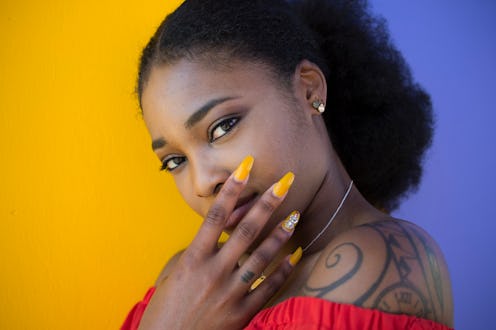Tattoos have finally made their way into the mainstream, which means that certain stigmas against people who have them should have vanished by now, right? Unfortunately we’re not out of the woods yet, though. Recent behavioral research shows that we’re moving towards widespread tattoo acceptance, but that we’ve still got a ways to go before we get there.
A recent study published in The Social Science Journal examined tattoo behavior and bias, with some of the findings being… shall we say, not so surprising. If you have a lot of friends or family members with tattoos, for instance, you’re more likely to think that getting inked isn’t a big deal. However, researchers also found that the more tattoos a person had, the more stigmatized they felt—and the more stigmatized they felt, the more likely they are to cover their tattoos up or have them removed. Again, not surprising, but with the proliferation of shows like LA Ink and people like Kat Von D, you’d think — or at least hope — that tattoo stigma was finally fading away.
Clearly there are bigger forces at work with regards to how we view tattoos, with “meaning” being one of the biggest. TIME, for example, noted that research published in The Social Science Journal last August provides more context for the issue: This earlier study found that people feel compelled to imbue their tattoos with meaning — but also that if their “tattoo narratives” feel “insufficient” to themselves or to other people, they’re more likely to regret it later. The study cited a number of participants who regretted their tattoos, including a woman with a relatively meaningless lizard tattoo who wished she hadn’t gotten inked just for the hell of it. More interestingly, though, were participants like the man who had gotten the date he overdosed on heroin tattooed as a reminder to himself. People constantly asked him about the date, something of which he grew wary — and understandable so. Would you want to keep feeling pressured to tell people you’ve just met about your past addiction and brush with death? Probably not.
You tell 'em, Watson.
This brings up an interesting question about social etiquette surrounding tattoos in general, and in particular tattoos that don’t belong to you. I’m reminded of an excellent piece written by Jamie Peck over at The Gloss a few years ago, "Please Stop Asking Me What My Tattoos Mean.” Sure, you can make the argument, “Well, it’s there, and I can see it, so of course it’s fair game or me to ask you about it” — except that it’s really not. People don’t generally feel compelled to ask someone why they’re wearing a purple shirt or what their earrings “mean,” so why would you ask the same of someone’s tattoos? It’s a matter of entitlement. No one is entitled to an explanation of someone else’s choices with regards to their own body (gee, what does that sound like?).
There’s also this: What’s meaningful for one person may not be meaningful for another. I only have one tattoo — a tiny one on the inside of my left wrist — but even though it’s meaningful for me, I usually get blank looks when people ask me to explain to them what it is. But you know what? It doesn’t matter what anyone else thinks. Peck wrote that most of her tattoos (which, by the by, are gorgeous works of art) for one very simple reason: “I liked the way they looked, tried them on for size, liked how they looked on my body, and wanted to make them permanent.” That’s more than sufficient, I think.
Anyway, what behavioral science is telling us is that if tattoos have “meaning,” then a) we’re happier with them, and b) people are more likely to accept them. I think we need to do more than that, though. Like so many other things, we need to remind ourselves that what one person chooses to do with their body isn’t the business of anyone except that person. Maybe if we all learned to think like that, the stigma would finally end up where it belongs: Dead. After all, people are people, no matter what they look like, right?
